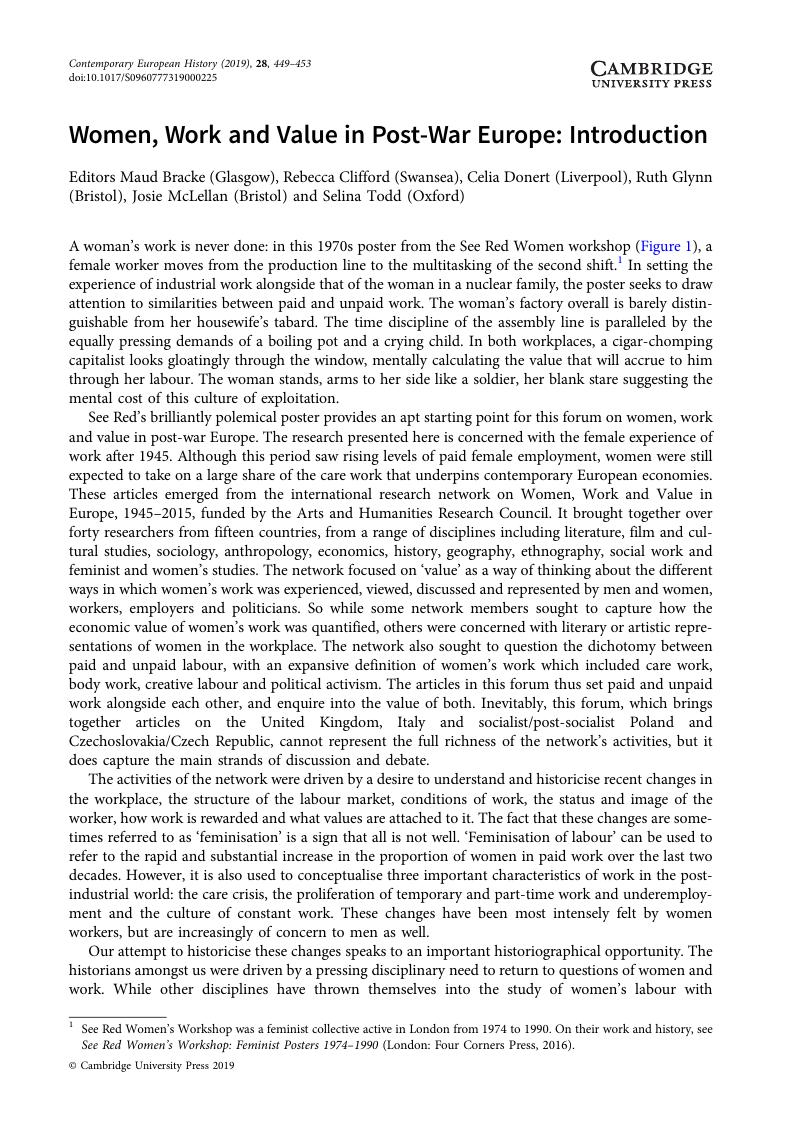No CrossRef data available.
Article contents
Women, Work and Value in Post-War Europe: Introduction
Published online by Cambridge University Press: 31 October 2019
Abstract

- Type
- Introduction
- Information
- Copyright
- Copyright © Cambridge University Press 2019
References
1 See Red Women's Workshop was a feminist collective active in London from 1974 to 1990. On their work and history, see See Red Women's Workshop: Feminist Posters 1974–1990 (London: Four Corners Press, 2016).
2 For the earlier period, see among many others Steedman, Carolyn, An Everyday Life of the English Working Class: Work, Self and Sociability in the Early Nineteenth Century (Cambridge: Cambridge University Press, 2013)CrossRefGoogle Scholar; Tilly, Louise and Scott, Joan, Women, Work, and Family (New York: Routledge, 1988)Google Scholar; Todd, Selina, Young Women, Work and Family in England 1918–1950 (Oxford: Oxford University Press, 2005)CrossRefGoogle Scholar; Todd, Selina, The People: The Rise and Fall of the Working Class 1910–2010 (London: John Murray, 2014)Google Scholar; Mark Hailwood and Jane Whittle, ‘The Gender Division of Labour in Early Modern England’, forthcoming in Economic History Review.
3 McLellan, Josie, ‘The “Problem of Women” in Post-War Europe’, English Historical Review 130 (545) (2015), 934–44CrossRefGoogle Scholar.
4 For instance: Boris, Eileen, Hoehtker, Dorothea, Zimmermann, Susan, eds, Women's ILO. Transnational Networks, Global Labour Standards, and Gender Equity, 1919 to Present (Leiden: Brill, 2018)Google Scholar; Fodor, Eva, Working Difference: Women's Working Lives in Hungary and Austria 1945–1995 (Chapel Hill, North Caroline: Duke University Press, 2003)CrossRefGoogle Scholar; Alsop, Rachel, A Reversal of Fortunes? Women, Work and Change in East Germany (Providence, RI: Berghahn Books, 2000)Google Scholar; McDowell, Linda, Migrant Women's Voices Talking about Life and Work in the UK since 1945 (London: Bloomsbury, 2016)Google Scholar; Betti, Eloisa, ‘Gender and Precarious Labor in a Historical Perspective. Italian Women and Precarious Work Between Fordism and Post-Fordism’, International Labor and Working-Class History, 89 (2016), 62–83CrossRefGoogle Scholar; Clarke, Jackie, ‘Closing Time: Deindustrialization and Nostalgia in Contemporary France’, History Workshop Journal, 79, 1 (2015), 107–25CrossRefGoogle Scholar; McCarthy, Helen, ‘Women, Marriage and Paid Work in Post-War Britain’, Women's History Review 26, 1 (2017), 46–61CrossRefGoogle Scholar.
5 Bracke, Maud, ‘Between the Transnational and the Local: Mapping the Trajectories and Contexts of the Wages for Housework Campaign in 1970s Italian Feminism’, Women's History Review 22, 4 (2013), 625–42CrossRefGoogle Scholar; Waring, Marilyn, If Women Counted: A New Feminist Economics (London: Macmillan, 1988)Google Scholar; Folbre, Nancy, Who Pays For The Kids? Gender and the Structures of Constraint (London: Routledge, 1994)CrossRefGoogle Scholar.
6 Pettifor, Ann, The Coming First World Debt Crisis (Basingstoke: Palgrave Macmillan, 2006)CrossRefGoogle Scholar; Weeks, John, The Economics of the 1% (London: Anthem, 2014)Google Scholar.
7 Valerija Barada and Jaka Primorac, ‘Between a Rock and a Hard Place: Valuing Female Creative Labour’, paper given at workshop ‘The Value of Women's Work: Between the Subjective and the Economic’, EUI Florence, 24–5 Oct. 2014.




